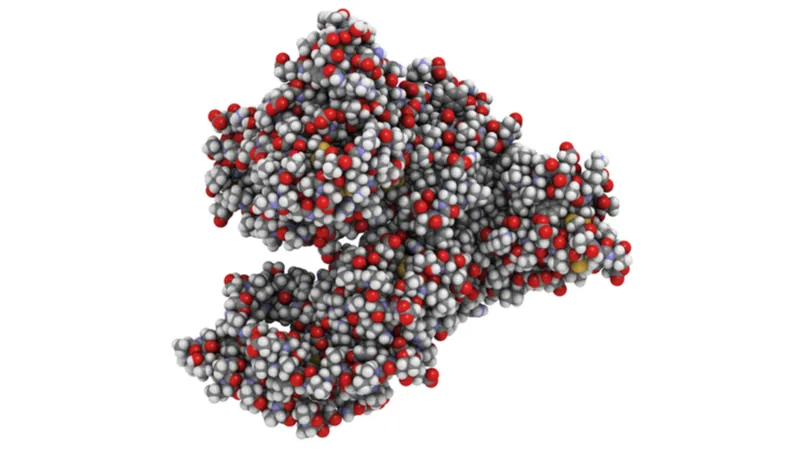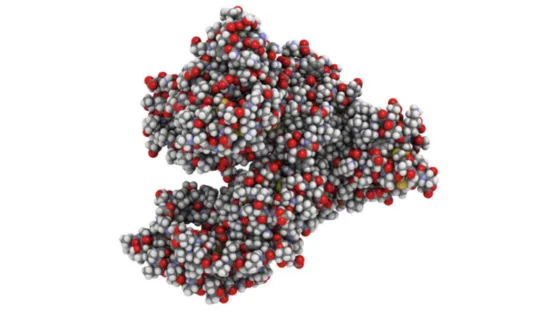Before we begin, it should be noted that this study was published on biorxiv, a pre-print website that hosts papers prior to peer review. Therefore the data should not be regarded as conclusive or accurate until it has been subject to the peer review process and accepted for journal publication. Please keep that in mind while reading this article and also when assessing the pre-print itself.
Researchers behind a new manuscript claim that the lifespans of middle-aged mice can be increased up to 20% with a treatment of recombinant serum albumin every 3 weeks.
Serum albumin is a component of blood plasma in vertebrates, produced by the liver, and the most common blood protein found in mammals. Albumin maintains the oncotic pressure needed for the correct distribution of fluids between blood vessels and bodily tissues. Without the presence of albumin, the high pressure of the blood vessels would push more fluids into the tissues. Additionally, serum albumin is a plasma carrier, as it binds several hydrophobic steroid hormones, and it acts as a transport protein for hemin and fatty acids.
The study builds on the existing work of researchers such as Drs. Irina and Michael Conboy, who have demonstrated that aging includes modification of circulating blood factors, including serum albumin. Most recently, they showed that diluting aged blood rejuvenates old brains, improving cognition, reducing neuroinflammation, and spurring neurogenesis in old mice.
Researchers report increased longevity with albumin treatment
The researchers of this study hypothesized that at least some of the detrimental effects of aging are due to changes to serum albumin and the harmful reactions to it [1]. This makes total sense given that the bloodstream is essentially the internet of the body, allowing distant parts to communicate with each other and to react to the signaling factors circulating in the blood.
They proposed to test this by delivering unmodified serum albumin to middle-aged mice in order to dilute the presence of damaged albumin in the animals. In essence, their aim was to intervene against this aspect of aging by reversing the damaging responses to pro-aging signals in the blood.
It was unknown if this process might increase lifespan; as while previous experiments had consistently shown that rejuvenation of tissue and organs was possible, no lifespan studies had ever been carried out before, most likely due to the high costs of such studies.
The middle-aged mice (12 months old) were given serum albumin at 1.5 mg per gram of body weight or isometric saline every 3 weeks for the control group until the animals died naturally. A lifespan increase of 17.6% for females and 20.3% for males was reported by the researchers at the end of the study. The researchers also claimed that the appearance of animals of both sexes were better in the treated group, with glossier and thicker fur apparently being observed.
In addition to increased longevity, the researchers claimed that the treated mice also had increased grip strength and were better able to escape from a Barnes maze test.
Improvement of longevity is an eternal dream of human beings. Here we report that a single protein recombinant mouse serum albumin (rMSA) improved the lifespan and healthspan of C57BL/6N mice. The median lifespan extensions were 17.6% for female and 20.3% for male, respectively. The grip strength of rMSA-treated female and male mice increased by 29.6% and 17.4%, respectively. Meanwhile, the percentage of successful escape increased 23.0% in rMSA-treated male mice using the Barnes Maze test. The rMSA used in this study is young and almost undamaged. We define the concept “young and undamaged” to any protein without any unnecessary modifications by four parameters: intact free thiol (if any), no advanced glycation end-product, no carbonylation, and no homocysteinylation. Here “young and undamaged” rMSA is much younger and less damaged than the endogenous serum albumin from young mice at 1.5 months of age. We predict that young and undamaged proteins altogether can further improve the longevity.
Human serum albumin (HSA, UniProtKB P02768) is the most abundant protein in blood plasma with a serum half-life of about 21 days. Damages or unnecessary modifications of HSA are related to many pathological conditions and increase with age. Firstly, the single free thiol in Cys-34 residue of HSA has been proposed to account for approximately 80% of the total free thiols in plasma, whose oxidation is intimately linked with aging and age-related diseases. Secondly, in oxidative environments, carbonyls are also formed especially on the side chains of Pro, Arg, Lys and Thr residues in proteins. Elevated carbonyl levels in HSA have been found to be related to aging and varieties of diseases. Thirdly, the AGE accumulation of HSA is another important factor found to be involved in aging. It is widely reported that AGE formation impairs normal functions of albumin and can induce inflammatory responses, which is connected with aging and the progression of serious diseases. Fourthly, it has been widely reported that homocysteine (Hcy) increases with age and is associated with age-related degenerative disorders. HSA is a major target for homocysteinylation, thus it can efficiently protect other proteins from the toxicity of Hcy.
Therefore, treatment of freshly prepared recombinant serum albumin with no damages or unnecessary modifications is most likely to extend lifespan and healthspan. Here we report that young and undamaged recombinant mouse serum albumin (rMSA)-treated groups in natural aging mouse model obtained significantly extended lifespan with increased skeletal muscle strength and cognitive ability compared with saline-treated groups.
Conclusion
There has been considerable debate recently about whether experiments like this work by restoring lost beneficial factors in aged blood or by reducing harmful factors. If the study results here are to be believed, then it suggests that fresh albumin is enough to increase lifespan in mice. It may be the case that introducing fresh albumin to aged blood dilutes the pro-aging factors and perhaps even compensates for the existing potentially damaged albumin already present. However, more research is needed in order to establish this and the study should ideally be replicated independently,
In general, we are enthusiastic about interventions that seek to dilute, block, or even remove the harmful signals present in aged blood. We believe that they may potentially be the first true rejuvenation therapies to reach humans, given that the technology to do this is already available with little modification and would be relatively inexpensive to implement at scale.
If you are interested in learning why we have such optimism, take a look at last year’s interview with the Conboys. In fact, one group of biohackers in Russia was so excited about the idea that they couldn’t wait and decided to conduct their own longevity experiment on themselves. You can learn more about their biohacking experiment here.
Literature
[1] Tang, J., Ju, A., Li, B., Zhang, S., Gong, Y., Ma, B., … & Luo, Y. (2021). Young and Undamaged rMSA Improves the Longevity of Mice. bioRxiv.




